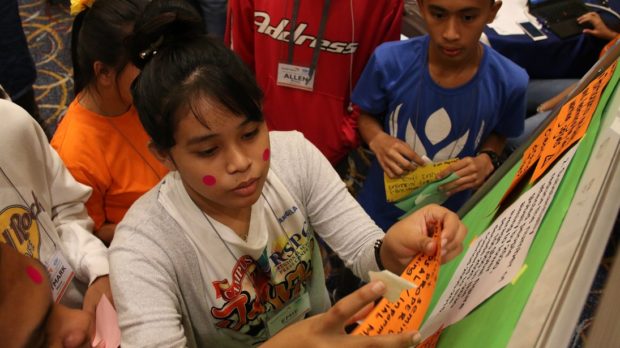
The workshop organized by Unicef and World Vision provided children with a conducive platform to share their thoughts and issues on improving disaster risk reduction involving the youth. CONTRIBUTED PHOTO
Around 50 children from all over the Philippines have presented a unified statement calling leaders and concerned groups for the deliberate involvement of children in the Disaster Risk Reduction (DRR) agenda.
They asked key government agencies, including the National Disaster Risk Reduction Management Council, Office of Civil Defense, and the National Youth Commission to document children affected by disasters and account the economic impact of disasters to children.
They also asked the agencies to help raise awareness on policies and campaigns promoting DRR, allocate budget for child-focused DRR activities, engage children in the local DRR councils, and in planning and mapping assessments and implementation.
The event, called the National Consultation with Children and Youth on Disaster Risk Reduction, was organized by UN children’s agency Unicef and World Vision. It was held to gather youth voices for the Asian Ministerial Conference for Disaster Risk Reduction’s 8th year to be held in Ulaanbatar, Mongolia.
“It is undeniable that children are the most vulnerable during disasters and emergencies. If we don’t involve them to be resilient and more proactive, all our DRR initiatives could only go so far. Youth participation is pivotal in ensuring our efforts are adaptive to their context and capacity to mitigate disaster risks,” World Vision’s National Director Rommel Fuerte says.
Creative presentations of children participants expressed children’s issues and proposed solutions on disaster risk reduction. CONTRIBUTED PHOTO
The workshop gave the young participants an opportunity to learn the Sendai Framework of Action, a global agreement comprised of seven targets which aim to collectively track and reduce the loss of lives and increase national disaster resilience among participating countries, including the Philippines, by 2030.
“Children typically represent 50 to 60 per cent of those affected by disasters, whether through loss of life or from diseases related to malnutrition and poor water and sanitation. Disasters also disrupt education and can cause psychological distress. Knowing how children are affected by disasters, and getting their ideas on how to prevent and mitigate the adverse impacts of these disasters is an important area of Unicef’s work,” Lotta Sylwander, Unicef Philippines Representative said.
“I feel like we are finally breaking the notion that children and youth are just children and youth. We are finally speaking our voices and we’re finally gaining more trust from the government. As children and youth, we are efficient and effective agents of change,” says Angela Naco, 18, one of the youth participants.